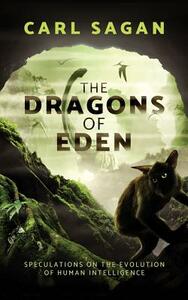Take a photo of a barcode or cover
128 reviews for:
The Dragons of Eden: Speculations on the Evolution of Human Intelligence
Carl Sagan
128 reviews for:
The Dragons of Eden: Speculations on the Evolution of Human Intelligence
Carl Sagan
informative
fast-paced
Excellent book! Educational and fun, beautifully written, it ranges over many topics to offer a wide scenic tour of what a mind is, how did the human mind get to its present state, and how its future evolution might be.
Packed with data, it's not your average science book, in that Sagan proffers almost more questions than answers. The tagline is very appropriate indeed, for it's more about describing and then speculating and wondering about how things are than any actual explanation of any single theory. Popular science at its best.
Accidentally, it also shows how fast science progresses. By the time this book was written, the most likely hypothesis for the extinction of dinosaurs (spoiler alert) was the radiation from a nearby supernova. Something so widely known today wasn't even hinted at just forty years ago! Impressive! (PS - disclaimer: don't you worry, the remaining 99.9% of the book has aged rather well!)
Packed with data, it's not your average science book, in that Sagan proffers almost more questions than answers. The tagline is very appropriate indeed, for it's more about describing and then speculating and wondering about how things are than any actual explanation of any single theory. Popular science at its best.
Accidentally, it also shows how fast science progresses. By the time this book was written, the most likely hypothesis for the extinction of dinosaurs (spoiler alert) was the radiation from a nearby supernova. Something so widely known today wasn't even hinted at just forty years ago! Impressive! (PS - disclaimer: don't you worry, the remaining 99.9% of the book has aged rather well!)
funny
informative
informative
reflective
medium-paced
This book is an interesting look into the evolution of the brain, extensive exploration into how it works or at least might work including comparisons to the brains and intelligence of other species, how that evolution shaped behaviour and societies, and a look into the future of the development of human intelligence. Given that it was written in 1977, some of the science is likely dated (I don't know enough about it to say), but a lot of Sagan's commentary is based on studies that had been conducted at the time, many very recently as of its writing. While our understanding of the brain and of conditions affecting it have almost certainly gotten better in the intervening years, that commentary is still interesting to read, and I imagine that some if not most of the science still holds up today.
Where the book really shows its age is in a section about where human intelligence will take us, where he discusses what at the time was modern computer science and even early electronic games. Obviously, we have the benefit of knowing where those things went, but it's still interesting to read his speculations and enthusiasm about them. On the other hand, there are other things discussed in this section that are still relevant today, such as decisions about when to use science and when not to and how society decides what things are objectionable, even delving into the difficult discussion of what stage of development a human is a human in relation to the topic of abortion, an argument which still carries on to this day.
There are certainly more recent books to read if you're looking for information about brain science, but this one is still an interesting read if you want to hear about Sagan's perspective and opinions on the topic. This book was somewhat of an experiment for him and he admits as much, given that his primary expertise is astrophysics, but I think it succeeds in provoking thought nonetheless even today.
Where the book really shows its age is in a section about where human intelligence will take us, where he discusses what at the time was modern computer science and even early electronic games. Obviously, we have the benefit of knowing where those things went, but it's still interesting to read his speculations and enthusiasm about them. On the other hand, there are other things discussed in this section that are still relevant today, such as decisions about when to use science and when not to and how society decides what things are objectionable, even delving into the difficult discussion of what stage of development a human is a human in relation to the topic of abortion, an argument which still carries on to this day.
There are certainly more recent books to read if you're looking for information about brain science, but this one is still an interesting read if you want to hear about Sagan's perspective and opinions on the topic. This book was somewhat of an experiment for him and he admits as much, given that his primary expertise is astrophysics, but I think it succeeds in provoking thought nonetheless even today.
Very good considering that Carl Sagan is writing outside of his field. Great speculations on the evolution of human/animal intelligence. Minus 1 star for being heavily outdated (originally published in 1977). I'll definitely be reading a more recent book on the same topic; written by a neuroscientist rather than an astrophysicist.
Lots of people misses the point with calling this book outdated, and even random. What the author has to say about the human brain itself can be purely wrong, it doesn't necessarily matter in the sense of human intelligence, because this book is about human intelligence, not the human brain. Also note the title that clearly says "speculations".
I'd even say, that this book is a rather fun and easy read about the concept of intelligence in general. Through several biological and linguistic phenomenons Sagan introduces the readers to an unbiased view of human intelligence, that can and should be compared to for example animal intelligence. Even when he talks about the estimates of some information specifications of a human brain, he is comparing human intelligence to machine intelligence.
This book may be light on the side of science but it's a really great introduction to the concept of intelligence in general. What I did enjoy as well is reading how empathic and reasonable he is with every matter covered in this book.
It has interesting or even weird ideas (like cultural myths encoded in our genes) that could be classified science-fiction but the point is getting rid of our biased view on human intelligence, looking at it in a more general way.
I'd even say, that this book is a rather fun and easy read about the concept of intelligence in general. Through several biological and linguistic phenomenons Sagan introduces the readers to an unbiased view of human intelligence, that can and should be compared to for example animal intelligence. Even when he talks about the estimates of some information specifications of a human brain, he is comparing human intelligence to machine intelligence.
This book may be light on the side of science but it's a really great introduction to the concept of intelligence in general. What I did enjoy as well is reading how empathic and reasonable he is with every matter covered in this book.
It has interesting or even weird ideas (like cultural myths encoded in our genes) that could be classified science-fiction but the point is getting rid of our biased view on human intelligence, looking at it in a more general way.
I read this book for a class. And I'm truly glad I did because it was very good. The great thing about this book it's that it's not just a divulgation reading, but a text that often asks you questions while you read, and allows you to wonder about a surprising range of topics, from animal mistreat to abortion.
I like to think that just by reading this book many people would question their posture in such topics, and I also find it appalling that even all those years after Sagan wrote this many debates still stand, and many postures still need changing.
I like to think that just by reading this book many people would question their posture in such topics, and I also find it appalling that even all those years after Sagan wrote this many debates still stand, and many postures still need changing.




